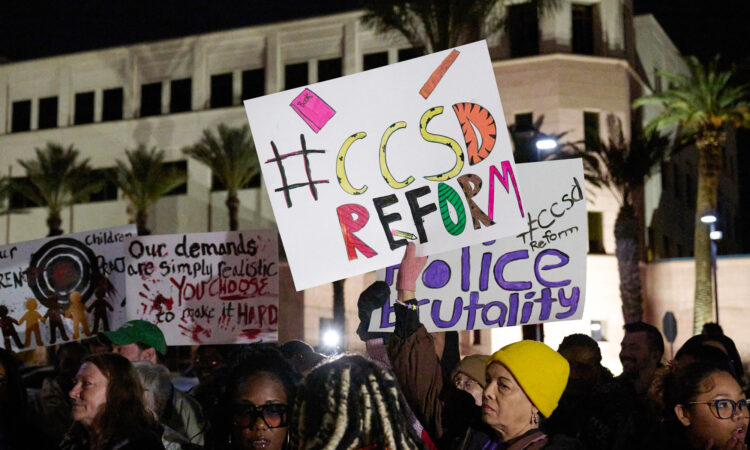
Of course police body cam footage is public.
Despite this obvious truth, however, it still took the American Civil Liberties Union nearly a year to get hold of footage from a 2023 incident near Durango High School that sparked concerns about police violence — and taxpayers paid for every cent of the Clark County School District’s quixotic effort to keep those records concealed.
Cellphone footage of an altercation between Clark County School District police and a group of students went viral in February of last year after one of the officers was seen slamming a high school student to the ground and pinning him underneath his knee. After local media reported on the incident, an investigation was launched into the officers’ conduct, but activists and concerned citizens were still (rightly) demanding more information about what led to such an aggressive moment of policing.
Those demands, however, fell on deaf ears.
The district flatly denied the ACLU’s request to view records related to the incident, including bodycam footage worn by the officers — footage that ostensibly exists for the specific purpose of holding officers accountable to the public. District officials even hired outside legal help to fight the ACLU’s eventual lawsuit.
Athar Haseebullah, the executive director of the ACLU of Nevada, described the unnecessary delay and protracted legal battle as “horrendous” in an interview with this columnist.
“One of the biggest slaps to the face for the public is that these agencies have full-time lawyers and yet they still go out and pay for big expensive private law firms to fight against the release of public records with our public dollars,” he explained.
Such behavior is, indeed, appalling. However, it’s not surprising. For most government agencies, spending tax dollars to keep the public in the dark is considered nothing more than a routine cost of doing business — as is illustrated by the utter lack of concern shown by CCSD trustees.
“Not one trustee has stepped up to ask about the expenditures associated with this,” added Haseebullah. “They just blatantly approved this, as if it was a good idea.”
Maybe the trustees really thought it was a good idea. After all, it’s not money from their pocket being spent on expensive legal services to deny the public basic information about controversial events. Why wouldn’t they take a stab at keeping potentially embarrassing public information from coming to light?
Such a nonchalant disregard for the public interest demonstrates one of the most glaring deficiencies of our current public records law in Nevada: There’s simply no incentive for government officials to err on the side of transparency. Instead, it’s far easier to refuse public records requests and merely hope the requestors don’t have the patience or resources to effectively fight them in court.
Luckily, in this case, there was an organization that was willing to do precisely that. Had it not been for the ACLU’s willingness to see this case to the end, parents would likely never have received answers from their own school district about a violent altercation between officers and students — illustrating in an especially powerful way just how toothless our state’s transparency laws actually are in practice.
To be fair, CCSD isn’t alone in its wanton disregard for the state’s Public Records Act. In virtually all levels of government, agencies similarly default to a culture of closed doors and contempt for public accountability. From school districts to entire city governments, court battles to uncover public records are so commonplace as to almost be unremarkable.
As with any agency that loses its court battle to conceal records, CCSD will end up having to pay the legal bills for the ACLU — but that’s hardly a “penalty” given that taxpayers ultimately foot that bill.
Meanwhile, everyone involved in the actual decision to flout the state’s transparency laws will avoid even a hint of accountability. The lawyers who argued that bodycam footage isn’t public will still get paid, district officials will keep their jobs and the individual government employees who denied the requests in the first place won’t face so much as a slap on the wrist.
With such a system in place, no wonder the default attitude among many public agencies is to effectively tell would-be public records requestors to get lost or lawyer up.
Unfortunately, it’s a dynamic that isn’t likely to change any time soon, according to Haseebullah. Recent attempts to add teeth to Nevada’s public records laws have largely fallen flat due to intense lobbying by public agencies and a remarkable lack of will among certain elected officials.
“Lawmakers have the same vested interest in not complying with open records [as most agencies], and they’re not going to change that,” said Haseebullah.
Judging by the Legislature’s own disregard for transparency, he’s likely correct. And, as a result, we unfortunately have to continue living in a world where our own government is perversely incentivized to fight transparency reforms, deny records requests and scoff at the idea of public accountability.
And we, the public, will continue to fund every cent of it.
Michael Schaus is a communications and branding expert based in Las Vegas, Nevada, and founder of Schaus Creative LLC — an agency dedicated to helping organizations, businesses and activists tell their story and motivate change. He has more than a decade of experience in public affairs commentary, having worked as a news director, columnist, political humorist, and most recently as the director of communications for a public policy think tank. Follow him at SchausCreative.com or on Twitter at @schausmichael.






